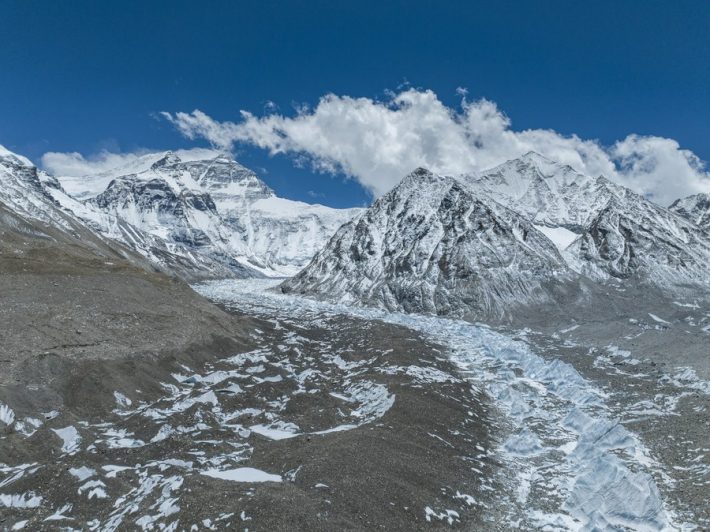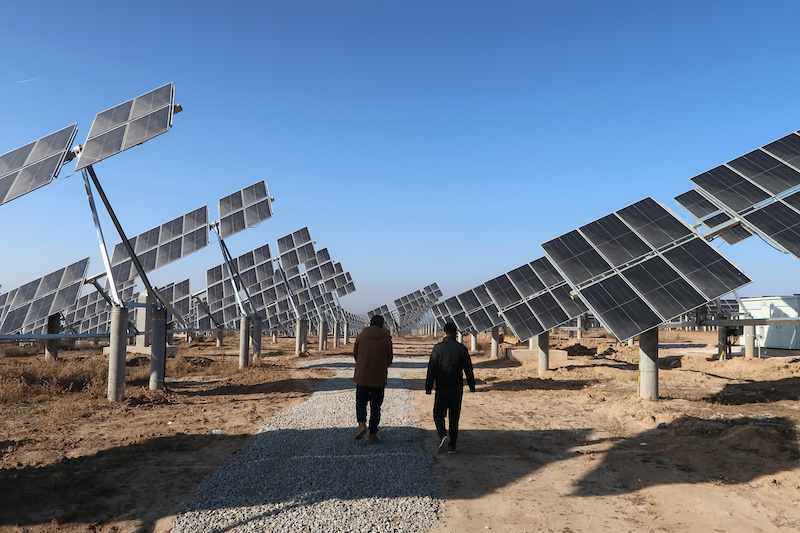Chinese scientists say the Tibetan Plateau is getting warmer and wetter, and have warned that the region – which is the source of most of Asia’s biggest rivers – faces greater risks of extreme weather.
Researchers from the Chinese Academy of Sciences said on Sunday the plateau “will enter a super warm and humid phase that will see more than half of the glacier mass melting in some areas and lake water levels rising by more than 10 metres by the end of the century,” a report said on Tuesday.
The amount of grassland and forest has risen by 6% to 12% over the last 15 years and, while that could hinder desertification, it could cause “significant shifts in the Asian monsoon circulation, potentially increasing the frequency of extreme weather events in China,” a researcher was quoting as saying in by the South China Morning Post.
ALSO SEE: Japanese Officials Seek $4.7bn Valuation for Tokyo Metro IPO
China, which consumes more coal than the rest of the world combined, is already seeing serious bouts of extreme weather.
Its carbon and greenhouse gas emissions are causing severe economic impacts at home and abroad. Extreme weather events such as torrential rain and floods cost China 76.9 billion yuan ($10.1 billion) in economic losses last month alone.
But concern about intensifying heat is now clearly a global crisis. The World Meteorological Organization said late last month that at least 10 countries have reported temperatures above 50C.
And a renowned climate historian told the Guardian last week that 15 national heat records have been broken since the start of this year.
China has led the way in the global transition to renewable energy, while wind and solar sources are said to have produced more energy than coal in the United States from January through July this year for the first time ever, according to a report by EcoWatch last Friday.
Fossil fuel sector ‘trying to slow energy transition’
But senior United Nations officials and environmentalists seem most concerned about the fossil fuel sector.
UN Secretary-General Antonio Guterres said in June that coal, oil and gas corporations were the “godfathers of climate chaos” because they had distorted the truth and deceived the public for decades over the environmental catastrophe their commodities were causing.
Coal, oil and gas companies should be banned from advertising to help save the world from climate change, the UN chief said.
And early this month, Selwin Hart, the UN’s assistant secretary general, accused fossil fuel companies of running “a massive mis- and disinformation campaign” so that countries will slow down the adoption of renewable energy and the speed with which they transition from a carbon-intensive economy.
“There is this prevailing narrative – and a lot of it is being pushed by the fossil fuel industry and their enablers – that climate action is too difficult, it’s too expensive,” Hart said.
“It is absolutely critical that leaders, and all of us, push back and explain to people the value of climate action, but also the consequences of climate inaction.”
Hart said a major global survey showed that 72% of people wanted a quick transition to clean energy sources.
In Canada, a report issued last week accused oil and gas companies and industry associations of “relentless lobbying” by holding some 1,255 meetings with federal government officials in 2023 in a bid to “obstruct climate progress.”
Meanwhile, people in the US and elsewhere appear concerned that a victory by Donald Trump in the election in November could cause billions of tonnes of extra carbon pollution, if he wins and imposes climate policies such as those outlined by the rightwing Project 2025 agenda.
But climate friendly outcomes are also happening. The US Department of the Interior announced last week that $775 million would be spent plugging orphaned oil and gas wells, which are considered legacy pollution sites that can contaminate groundwater and release nasty pollutants such as methane.
And in Australia, the Commonwealth Bank, one of the country’s biggest lenders, said last week that from next year it will no longer provide funds to coal, oil or gas companies that lack genuine emission reduction plans, in line with the Paris climate agreement.
Fossil fuel firms are – like the planet – facing heat that will only get more intense.
- Jim Pollard
NOTE: The photo on this report was changed on August 20, 2024.
ALSO SEE:
China Coal Output Rises But Power Generation Use Declines
Climate Change ‘Fuelled’ Rain That Led to Fatal Indian Landslides
Firms May Abandon Net-Zero Plans Amid Carbon Offset Uncertainty
Extreme Weather Cost China More Than $10 Billion In July Alone
China Turns to Carbon Capture, Biomass For Coal Power Emissions
Global Coal Capacity Growth Blamed on China, EU, US – FT
























